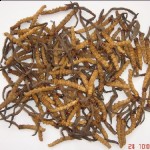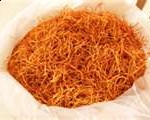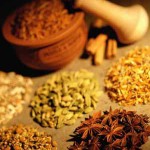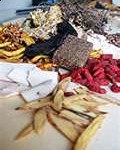 Kudzu, a vine also known as Ge Gen in Traditional Chinese Herbal Medicine has been considered a weed and an invasive species in the "Deep South" for the past 50 years.
Kudzu, a vine also known as Ge Gen in Traditional Chinese Herbal Medicine has been considered a weed and an invasive species in the "Deep South" for the past 50 years.
It has also been celebrated as one of the 50 most fundamental herbs in Chinese Medicine.
While first prized for its sweet smelling flowers, it’s encroaching and invasive nature soon made it unpopular to some and a flight of fancy for others. Here in the US, poetry, books and films have been written about this vine, and it has the making of a legend in its ability to grow one foot a day and up to sixty feet a year, covering any structure, small or large. Our picture shows it eating a car.
Festivals have been planned in its honor, clubs have been formed and individuals have been known to create hundreds of baskets from its vines. In Japan and China, it is used daily in teas and consumed just as turnips would be. Traditional Chinese Herbal Medicine practitioners have used kudzu for over 2000 years to treat many diseases, including diabetes, high blood pressure and high cholesterol.
Scientists in Alabama and Iowa have reported the first evidence that root extracts from kudzu show promise as a dietary supplement for a high-risk condition that affects almost 50 million people in the United States alone, metabolic syndrome. Scientists have been seeking natural substances that can treat metabolic syndrome, which creates an excessive amount of glucose in the blood and is linked to both diabetes and obesity.
A new study evaluated kudzu root extracts, which contain healthful substances called isoflavones. Connect here for Metabolic Syndrome Study Recently, there have also been several laboratory studies conducted on mice that show Kudzu to be effective in reducing alcohol intake. A study has shown this commonly used Chinese herb seems to prevent the usual increase in binge drinking that occurs after five days of abstinence and also prevents relapse.
Extracts of various parts of the kudzu vine are said to be "helpful in treating a variety of maladies, including alcoholism and intoxication," said Ting-Kai Li, a professor in the department of psychiatry at Duke University Medical Center, and former director of the National Institute on Alcohol Abuse and Alcoholism. Considering that nearly eighty percent of abstinent alcoholics or addicts relapse within a year, the value of Kudzu in helping to treat alcoholism could make it a legend in the world of medicine.
It has been suggested that once Kudzu has been further studied, this Chinese herb has a high likelihood of replacing Antabuse, a well-known but slightly toxic medication that is currently used to treat chronic alcoholism. One researcher involved in the study Dr. Diamond said we “hope this novel compound will become an effective therapeutic agent for alcoholism.” So what was once deemed a weed by the USDA, has the potential to become a goldmine for the South. It has even been suggested that Kudzu could be used to produce the same amount of ethanol as an acre of corn, thus supplementing our current energy resources as well. Click here for a link to the studies referenced.







